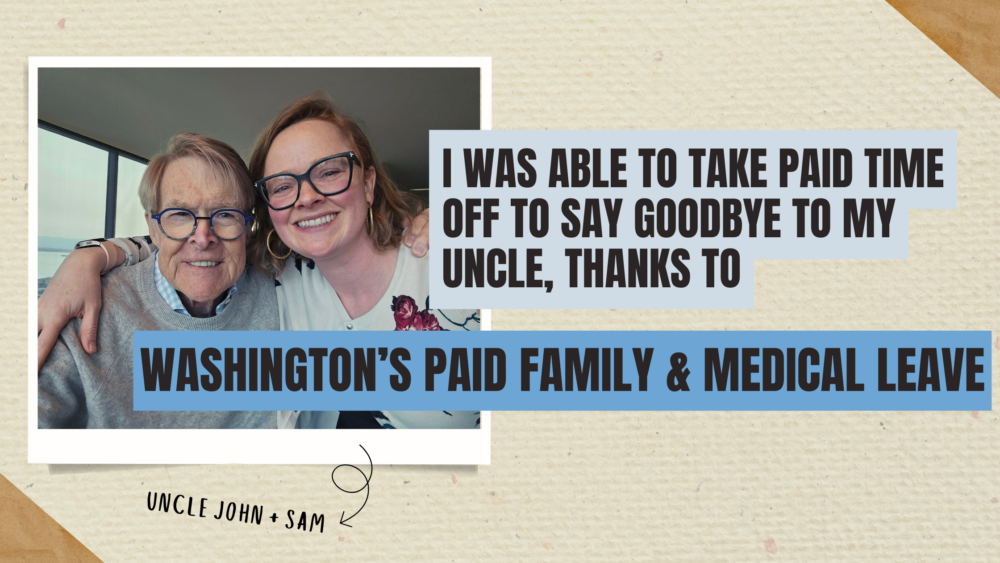
I love writing blog posts for EOI. I get to write about topics that I’m passionate about and share perspectives on a whole range of social justice and equity issues. But this one about Paid Family & Medical Leave is personal. Let me explain why.
After a very long fight with cancer, my Uncle John passed away peacefully a few weeks ago. This is hitting me hard. In addition to being a special elder in my life, my Uncle John was my champion. He cared for me as a baby and encouraged me to go to college. He even took me to my first LGBTQ march when I was 16. In short, he was like a second parent.
So when his cancer progressed this past year, I did not want to miss the chance to be there for him. I also wanted to support my aunt, who was doing the impossible job of managing all of his care. At first, I started helping out while balancing a busy time at work. I would leave my office to go to the hospital and visit in the evenings, but it was getting harder to balance my fast-paced job with wanting to be there for my family.
Why I Chose Paid Family & Medical Leave
As my uncle got sicker and needed constant care and support, I decided to apply for our state’s Paid Family & Medical Leave program. This program provides up to 12 weeks of paid leave to all workers who have worked 820 hours in the previous year. Workers can use the time to care for a seriously ill family member, recover from an injury, or take care of a new baby.
I knew I wanted to help my uncle in his last months and to spend more time with him as he died. I also knew that, thankfully, because of the new improvements to our state’s Paid Family & Medical Leave law, I would be able to do just that.
But just a few years ago, this would not have been possible. When EOI worked with our community and legislative partners to pass the Paid Family & Medical Leave law in 2017, it was an enormous step forward; however, it was limited in terms of who you could care for. You could receive paid leave to care for an ill or dying family member – but only if they were your immediate family, like a parent, grandparent, child, sibling, or spouse. The original law didn’t include uncles, aunts, or chosen family. Under the original law, I would not have been able to take time off to be with my uncle.
Expanding the Law, Expanding Rights
We know that families look different across different communities. And those of us who work in policy saw the need to broaden access to this important program.
In 2021, EOI and our many partners worked to expand the definition to recognize the diversity of Washington’s families. We understood that the initial definition of family was outdated. It did not reflect the reality of many people’s support systems, which often include extended and chosen family. Expanding the definition of family in PFML recognized the vital role these caregivers play and provides them with the support they need.
Because of this hard-fought change, I was able to spend quality time every week with my uncle during his last months. This gave my aunt a break to rest when she was exhausted and needed time to care for herself. I was able to help my uncle eat, track his medications, get him signed up with hospice, and to just hold his hand when he wanted company. And I was able to be in the room with him when he died.
I will always miss my Uncle John. But I will never regret getting the chance to be with him in his last moments. It’s times like these that I feel the real impact of the work we do at EOI. It’s not just about data and numbers. The policy work we do improves our lives. It has certainly improved mine.
We are fighting now for a similar expansion in the definition of our state’s existing Sick & Safe Leave policy to match PFML so that chosen and extended family can take paid leave to take care of their loved ones. Click here for more information.
More To Read
March 24, 2025
Remembering former Washington State House Speaker Frank Chopp
Rep. Chopp was Washington state’s longest-serving Speaker of the House
February 11, 2025
The rising cost of health care is unsustainable and out of control
We have solutions that put people over profits
January 29, 2025
Who is left out of the Paid Family and Medical Leave Act?
Strengthening job protections gives all workers time they need to care for themselves and their families
